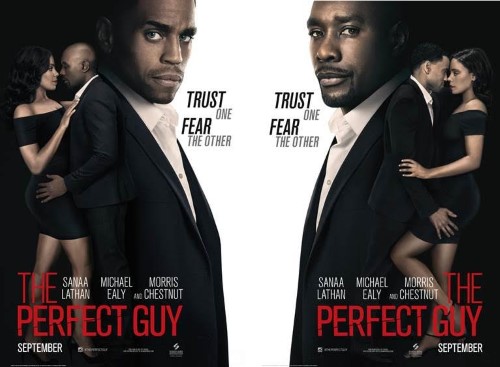The Perfect Guy Doesn’t Have Much to Him
3.5/5 stars.

The trailers for The Perfect Guy have sold it as a simple Lifetime stalker flick. And yeah, the basic summary of “woman dumps guy, meets better guy who seems too good to be true until he isn’t” could describe anything you’d find on Lifetime Movie Network at any given hour. But this movie is a bit smarter and artier below the surface. It’s not that smart, but it still has enough of a well-crafted and well-executed style to be interesting.
So here’s the story: well-to-do lobbyist Leah Vaughn (Sanaa Lathan) has a pretty great life with a literal glass house in LA and a steady relationship with hunky architect Dave (Morris Chestnut). But while she wants to marry & have children—“I’m 36 years old. I’ve dated my whole life! I’m dated out” as Leah puts it—Dave isn’t ready. After a party brings this issue up again, the two break up. A couple months later, Leah meets IT expert Carter Duncan (Michael Ealy) when he saves her from a creeping bro at a bar. Leah falls for his charm and the fact that he looks like Michael Ealy and she’s showing him off to her friends and parents in no time.
But after Carter nearly beats a man to death just for talking to Leah while they’re at a gas station—this scene’s been all over the movie’s advertising and it’s even more jarring and scary in context—she wisely cuts ties. But Carter—with his vast computer knowledge (remote servers and all that), ninja-esque stealth skills and a snug pair of latex gloves—doesn’t want to let her go and will do anything to make her stay.
The chief strength of this movie—and also what slightly sinks it—is that every beat is played so straightforward. Carter is absolutely a charming, sweet guy (after Leah tells him her dad (Charles Dutton) is a huge baseball fan, Carter presents him with home plate tickets to the next day’s game). But he’s also a frightening monster when white-hot anger bursts from beneath his calm facade. Leah is at first hopelessly in love and then terrified out of her mind. The way screenwriter Tyger Williams and director David Rosenthal present their story puts us entirely in Leah’s POV. That wouldn’t work as well without Lathan giving an absorbing performance that never tips into histrionics but it’s also the movie’s chief shortcoming.
Apart from a few scenes, we’re never outside of Leah’s point of view, which suffocates the other characters a bit. While character actor Holt McCallany makes the most of his few scenes as the helpful Detective Renkin who is just as frustrated by the law’s limited reach on cyberstalking as Leah is, Rutina Wesley and Kathryn Morris as Leah’s friends feel stranded. They don’t exist to do anything than react to whatever Leah tells them about. So too with Leah’s parents; Dutton and L. Scott Caldwell as Leah’s mom only show up for one setpiece and are so endearing that their absence is felt once the movie’s intensity starts ramping up.
The screenplay ultimately winds up with Leah taking matters into her own hands in a way which is empowering and interesting while also subtly praising the of gun ownership, which sits a little odd. So too do the revelations about Carter’s past, which fall back on awful stereotype. Still, Rosenthal uses shadows and close-ups well enough to suck you in. You just don’t really remember it after you leave the theatre. This is an interesting spin on an old story told well, but it’s ultimately just that and little else.
Tom Speelman is a contributor to The Mary Sue, Strange Horizons, Loser City and Sequart Organization. He’ll have an essay in a 2016 book on Star Wars comicsand yells about comics & music on Twitter @tomtificate.
—Please make note of The Mary Sue’s general comment policy.—
Do you follow The Mary Sue on Twitter, Facebook, Tumblr, Pinterest, & Google +?
Have a tip we should know? tips@themarysue.com